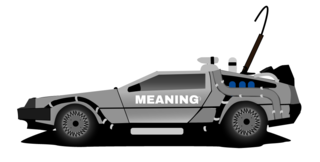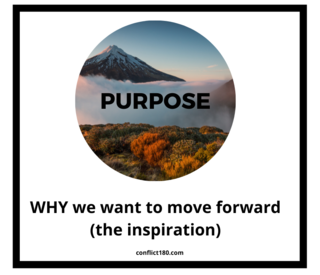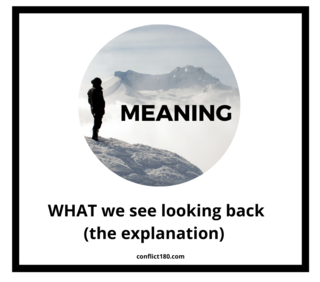Resilience
Change Your Future By Visiting Your Past
Protect yourself from stress and boost your resilience using this technique.
Posted September 7, 2021 Reviewed by Jessica Schrader
Key points
- We can travel into the past and impact our future by assigning meaning to what we have experienced.
- By using a tool called cognitive reappraisal, we can positively affect our neural pathways, cognitive abilities, and resilience.
- Two examples from the author's life illustrate the concepts.
For those of you who are science fiction fans, or simply fans of social science, I have good news and less good news.
Good news: Time travel is possible, right now, today. We can go into the past in our minds and shift how we think about it in ways that can change our future.
Less good news: It’s not as simple as getting into a souped-up DeLorean and flooring the gas pedal. It’s challenging and takes lots of practice.
More good news: It is never too late to start, and it’s truly worth it.
Dusting off our DeLoreans

In my last post on “4 Ways to Boost Resilience,” I briefly talked about the importance that a sense of purpose and meaning can play in helping us thrive during tough times.
Although I have used these two words interchangeably for most of my life, it turns out they are distinct, and that each of them supports our resilience in a different way.
Dr. Anthony Burrow, the author of The Ecology of Purposeful Living Across the Lifespan, describes purpose as the why that propels us forward, the reason we do what we do, the inspiration we have for being in this world.

Having a sense of purpose predicts a number of positive outcomes, from better health to more wealth—and I plan to cover this super-achiever of the resilience world in another post.
Today, however, I want to talk about the time-traveling machine we all have at our disposal: our ability to create alternative meanings from the same situation.
According to Burrows, meaning is what we say to ourselves looking back. It is how we explain what happened, the interpretation we give to past events.

Every time we go back to visit an event, we are time traveling. When we assign meaning to that event, we are shifting our own future.
While all events are made up of unchangeable facts, we can control which facts we highlight—and the story we tell ourselves about them. This story, especially when it takes on a particular pattern over time, can change our future in concrete and specific ways.
For instance, there is now evidence that repeatedly delving on the negative parts of an event can create neural changes in our brains that make us more susceptible to cognitive decline. A massive British study of more than 30,000 people also suggests that the meaning we ascribe to stressful and traumatic events can help protect us from depression and anxiety—or make these symptoms worse.
Thus, using tools like cognitive reappraisal, we can create a better tomorrow for ourselves when we find that we have been transported to yesterday. Cognitive reappraisal, which relies on reality-based information (not wishful thinking) to purposely reframe our explanation of what happened in the past, has been used to help people overcome mental health struggles (especially in situations where people feel low levels of control), improve performance in math, reduce some PTSD symptoms, and even make a tough run feel easier.
Below are two personal illustrations to show how it works.
One of my bucket-list items has been to visit the Grand Canyon before I turn 50. Over time, this goal turned into a desire to hike down and see the bottom of the canyon, which eventually morphed into a wish to backpack and camp in the canyon (with no backpacking experience whatsoever, when this final version of the dream solidified in 2018).
Two years and a pandemic later, I was 48 and time seemed to be speeding up. Thus, I began to make my way towards my goal by getting support, getting in shape, learning about backpacking, and going on increasingly more difficult backpacking trips with experienced groups of people. The latest of these was a four-day trek in the North Carolina Blue Ridge Mountains this summer. I trained for the trip by walking around my neighborhood with a heavy backpack, taking weekend hiking trips, and working with weights in the gym.
Some of the facts: (a) I was able to keep up with the other hikers on the NC trip; (b) I made it to the peak of Cold Mountain (our final destination); and (c) the climb was at the edge of my technical and physical abilities (for the non-hikers out there, "technical" means scrambling over loose rocks and pulling yourself up boulders while questioning whose idea it was to go on this trip).
The meaning: What meaning shall I assign to these facts?
Option 1: Do I focus on how difficult the climb felt, how the younger members of our group sometimes surged ahead of me with apparent ease, and how much my knees complained on the long trek down? Do I tell myself that I need to set a more “realistic” goal than the Grand Canyon, that I am too old to dream so big, that it will be too difficult for my aging body? Which future would this help to create?
Option 2: Or do I interpret the climb as something to be proud of, an illustration of my inner strength and stamina? Do I focus on the way I kept up with the group, the months of training I put in to get there, the ease with which I carried a 35-pound pack in the pouring rain for eight hours on day two, despite my squelching shoes? Do I tell myself that successfully climbing 2,000 feet of boulders and slippery rocks shows I can accomplish more than I ever thought possible? Do I tell myself that the Grand Canyon will be the biggest physical challenge of my life and clearly, I can get there? Which future would this help to create?
It’s easy to see how the interpretation I give to the facts of the trip will influence what I do next in terms of the Grand Canyon—and beyond.
A smaller and less dramatic example happened last week. One of my training goals has been to do two “tough” gym workouts a week. For these, I want to complete three circuits of stair-machine/plyo box/leg press (rinse and repeat). This particular week, in which I was feeling fatigued and somewhat “off,” I skipped one workout and barely dragged my body to the gym for the second one. Then, I was only able to complete one of the three circuits before giving up and making my way back to the car.
Sitting in the parking lot, I could hear the two parts of me dueling about which meaning to assign to my gym experience.

One part insisted that I was emotionally weak, lacked grit, and was never going to make it into the Grand Canyon at this rate. Another part reminded me that I made it to the gym during a tough week (true) and that one circuit is better for my body than zero (also true).
This example underscores one of the keys to cognitive reappraisal: it is not as much about validating your self-worth (you are awesome no matter what) as it is about finding a reality-based alternative explanation to the event that is also true.
It is also important to know thyself. While studies have shown that self-criticism and negative self-talk are not sustainable motivators for most people, there are individual differences. One thing we can do is start tracking what works for us. My personal experience has shown that celebrating small wins—when I can manage it—is a better way for me to get back on the stair machine than beating myself up.
How do we use our time machines to build resilience?

As I said in the beginning, learning to use our time machines to increase resilience takes practice and persistence. There are multiple times per day that we mindlessly get into our DeLoreans, revisit our past, assign meaning, and inadvertently shift our futures. Unfortunately, we often operate on automatic pilot and don’t even notice the science-fiction feat we have just accomplished.
The trick is to start doing it more mindfully so that we are first aware, and eventually in charge, of the choices we make.
The truth is that even when we remember that we have a choice, as I did in the parking lot, it can be challenging to go against our propensity to choose the more negative story. In my case, despite years of awareness and practice, my parking lot duel ended in a kind of grudging draw with neither side claiming victory.
Other times, however, I am successful. After all, I am now booked to travel into the Canyon this fall with a small group of other dreamers. Thus, even in thinking about how tough it is to time travel well, I need to choose my meaning with care. It is in my best interest to remind myself that I own a time machine and can use it to create a better future for myself, even if it’s not always easy and not always effective.
As we practice more, we gain increasingly more choice during our time-traveling forays. Even now, as some of you may be blaming yourselves for being “too negative” too often, you can take a moment to be kind to yourself and ask “what else is true?”
I hope you give your DeLoreans a spin and remember to have fun along the way.




